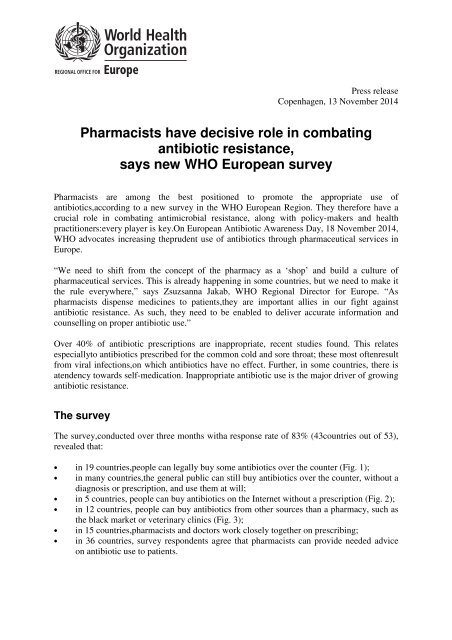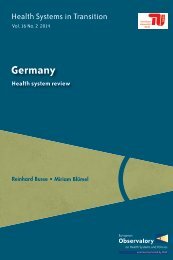Press-release,-Pharmacists-have-decisive-role-in-combating-antibiotic-resistance,-says-new-WHO-European-survey
Press-release,-Pharmacists-have-decisive-role-in-combating-antibiotic-resistance,-says-new-WHO-European-survey
Press-release,-Pharmacists-have-decisive-role-in-combating-antibiotic-resistance,-says-new-WHO-European-survey
Create successful ePaper yourself
Turn your PDF publications into a flip-book with our unique Google optimized e-Paper software.
<strong>Press</strong> <strong>release</strong><br />
Copenhagen, 13 November 2014<br />
<strong>Pharmacists</strong> <strong>have</strong> <strong>decisive</strong> <strong>role</strong> <strong>in</strong> combat<strong>in</strong>g<br />
<strong>antibiotic</strong> <strong>resistance</strong>,<br />
<strong>says</strong> <strong>new</strong> <strong>WHO</strong> <strong>European</strong> <strong>survey</strong><br />
<strong>Pharmacists</strong> are among the best positioned to promote the appropriate use of<br />
<strong>antibiotic</strong>s,accord<strong>in</strong>g to a <strong>new</strong> <strong>survey</strong> <strong>in</strong> the <strong>WHO</strong> <strong>European</strong> Region. They therefore <strong>have</strong> a<br />
crucial <strong>role</strong> <strong>in</strong> combat<strong>in</strong>g antimicrobial <strong>resistance</strong>, along with policy-makers and health<br />
practitioners:every player is key.On <strong>European</strong> Antibiotic Awareness Day, 18 November 2014,<br />
<strong>WHO</strong> advocates <strong>in</strong>creas<strong>in</strong>g theprudent use of <strong>antibiotic</strong>s through pharmaceutical services <strong>in</strong><br />
Europe.<br />
“We need to shift from the concept of the pharmacy as a ‘shop’ and build a culture of<br />
pharmaceutical services. This is already happen<strong>in</strong>g <strong>in</strong> some countries, but we need to make it<br />
the rule everywhere,” <strong>says</strong> Zsuzsanna Jakab, <strong>WHO</strong> Regional Director for Europe. “As<br />
pharmacists dispense medic<strong>in</strong>es to patients,they are important allies <strong>in</strong> our fight aga<strong>in</strong>st<br />
<strong>antibiotic</strong> <strong>resistance</strong>. As such, they need to be enabled to deliver accurate <strong>in</strong>formation and<br />
counsell<strong>in</strong>g on proper <strong>antibiotic</strong> use.”<br />
Over 40% of <strong>antibiotic</strong> prescriptions are <strong>in</strong>appropriate, recent studies found. This relates<br />
especiallyto <strong>antibiotic</strong>s prescribed for the common cold and sore throat; these most oftenresult<br />
from viral <strong>in</strong>fections,on which <strong>antibiotic</strong>s <strong>have</strong> no effect. Further, <strong>in</strong> some countries, there is<br />
atendency towards self-medication. Inappropriate <strong>antibiotic</strong> use is the major driver of grow<strong>in</strong>g<br />
<strong>antibiotic</strong> <strong>resistance</strong>.<br />
The <strong>survey</strong><br />
The <strong>survey</strong>,conducted over three months witha response rate of 83% (43countries out of 53),<br />
revealed that:<br />
• <strong>in</strong> 19 countries,people can legally buy some <strong>antibiotic</strong>s over the counter (Fig. 1);<br />
• <strong>in</strong> many countries,the general public can still buy <strong>antibiotic</strong>s over the counter, without a<br />
diagnosis or prescription, and use them at will;<br />
• <strong>in</strong> 5 countries, people can buy <strong>antibiotic</strong>s on the Internet without a prescription (Fig. 2);<br />
• <strong>in</strong> 12 countries, people can buy <strong>antibiotic</strong>s from other sources than a pharmacy, such as<br />
the black market or veter<strong>in</strong>ary cl<strong>in</strong>ics (Fig. 3);<br />
• <strong>in</strong> 15 countries,pharmacists and doctors work closely together on prescrib<strong>in</strong>g;<br />
• <strong>in</strong> 36 countries, <strong>survey</strong> respondents agree that pharmacists can provide needed advice<br />
on <strong>antibiotic</strong> use to patients.
13 November 2014, press<strong>release</strong><br />
page2<br />
Fig. 1. <strong>European</strong> countries <strong>in</strong> which <strong>antibiotic</strong>s can be bought legally over the counter<br />
Fig. 2. <strong>European</strong> countries <strong>in</strong> which <strong>antibiotic</strong>s canbe bought on the Internet without a prescription<br />
Fig. 3. <strong>European</strong> countries <strong>in</strong> which <strong>antibiotic</strong>s can be bought somewhere other than pharmacies
13 November 2014, press<strong>release</strong><br />
page3<br />
The <strong>survey</strong> results comprise part of a <strong>new</strong> <strong>WHO</strong> report,The <strong>role</strong> of pharmacist <strong>in</strong> encourag<strong>in</strong>g<br />
prudent use of <strong>antibiotic</strong> medic<strong>in</strong>es and avert<strong>in</strong>g antimicrobial <strong>resistance</strong>. 1 It was developed<br />
by the <strong>WHO</strong> Regional Office for Europe, <strong>in</strong> collaboration with the Pharmaceutical Group of<br />
the <strong>European</strong> Union (PGEU), the Europharm Forumand the<strong>WHO</strong> Collaborat<strong>in</strong>g Centre for<br />
Drug Policy and Pharmacy Practice Development at Pharmakon, the Danish College of<br />
Pharmacy Practice.<br />
<strong>Pharmacists</strong>’ <strong>role</strong><br />
<strong>Pharmacists</strong> can help prevent antimicrobial <strong>resistance</strong> <strong>in</strong> multiple ways. The guidel<strong>in</strong>es on<br />
good pharmacy practice,prepared jo<strong>in</strong>tly by the International Pharmaceutical Federation (FIP)<br />
and <strong>WHO</strong>, state: “The mission of pharmacy practice is to contribute to health improvement<br />
and to help patients with health problems to make the best use of their medic<strong>in</strong>es”. 2 This<br />
<strong>in</strong>cludes:<br />
• provid<strong>in</strong>g proper counsell<strong>in</strong>g when dispens<strong>in</strong>g <strong>antibiotic</strong>s to the patient and his/her<br />
family;<br />
• encourag<strong>in</strong>g patients to take the full prescribed <strong>antibiotic</strong> regimen;<br />
• work<strong>in</strong>g with prescribers to order sufficient doses to complete or cont<strong>in</strong>ue a course of<br />
therapy;<br />
• recommend<strong>in</strong>g therapies other than <strong>antibiotic</strong>s for m<strong>in</strong>or diseases;<br />
• provid<strong>in</strong>g updated <strong>in</strong>formation on <strong>antibiotic</strong>s to prescribers;<br />
• monitor<strong>in</strong>g the supply of <strong>antibiotic</strong>s and their use by patients.<br />
Good examples<br />
<strong>Pharmacists</strong>can be an effective l<strong>in</strong>k between prescribers and patients, and must utilize this<br />
position better to encourage the prudent use of <strong>antibiotic</strong>s.Good examples <strong>in</strong> the <strong>WHO</strong><br />
<strong>European</strong> Region can be found<strong>in</strong>, for example, Belgium, France, Norway, Spa<strong>in</strong>, the<br />
Netherlands and the United K<strong>in</strong>gdom.<br />
Another effective way ofensur<strong>in</strong>g prudent use is <strong>antibiotic</strong> stewardship, <strong>in</strong> which pharmacists<br />
monitor the dosage and duration of therapy, consult with doctors and counsel patients.<br />
Antibiotic stewardship is part of the curricula and postgraduate education for medical staff<br />
and/or pharmacists <strong>in</strong> more than half of the countriesrespond<strong>in</strong>g to the <strong>survey</strong>, but ithas not<br />
yet ga<strong>in</strong>ed sufficient momentum <strong>in</strong> Europe.In addition, as rapid diagnostic tools are<br />
<strong>in</strong>creas<strong>in</strong>gly becom<strong>in</strong>g available, these can assist with better target<strong>in</strong>g <strong>antibiotic</strong> treatment.<br />
F<strong>in</strong>ally, the regular collection of data on the prescription, sales and use of <strong>antibiotic</strong>s has great<br />
potential formonitor<strong>in</strong>g and mapp<strong>in</strong>g their consumption. The <strong>WHO</strong> Regional Office for<br />
Europe therefore encourages countries to report such data to the <strong>European</strong> Surveillance of<br />
1 The <strong>role</strong> of pharmacist <strong>in</strong> encourag<strong>in</strong>g prudent use of <strong>antibiotic</strong> medic<strong>in</strong>es and avert<strong>in</strong>g antimicrobial <strong>resistance</strong><br />
– a review of current policies and experiences <strong>in</strong> Europe. Copenhagen: <strong>WHO</strong> Regional Office for Europe; 2014<br />
(http://www.euro.who.<strong>in</strong>t/en/health-topics/Health-systems/medic<strong>in</strong>es/publications2/2014/the-<strong>role</strong>-of-pharmacist<strong>in</strong>-encourag<strong>in</strong>g-prudent-use-of-<strong>antibiotic</strong>-medic<strong>in</strong>es-and-avert<strong>in</strong>g-antimicrobial-<strong>resistance</strong>-a-review-of-currentpolicies-and-experiences-<strong>in</strong>-europe,<br />
accessed 13 November 2014).<br />
2 <strong>WHO</strong> Expert Committee on Specifications for Pharmaceutical Preparations. Forty-fifth report. Geneva: World<br />
Health Organization, 2011 (<strong>WHO</strong> Technical Report Series, No. 961;<br />
http://apps.who.<strong>in</strong>t/medic<strong>in</strong>edocs/en/d/Js18652en, accessed 13 November 2014).
13 November 2014, press<strong>release</strong><br />
page4<br />
Antimicrobial Consumption Network (ESAC-Net) of the <strong>European</strong> Centre for Prevention and<br />
Control (ECDC), and the Central Asian and Eastern <strong>European</strong> Surveillance of Antimicrobial<br />
Resistance (CAESAR) network, a jo<strong>in</strong>t <strong>in</strong>itiative of the Regional Office, the <strong>European</strong> Society<br />
of Cl<strong>in</strong>ical Microbiology and Infectious Diseases (ESCMID) and the Dutch National Institute<br />
for Public Health and the Environment (RIVM).<br />
Note to editors<br />
• The <strong>WHO</strong> <strong>European</strong> policy frameworkfor health and well-be<strong>in</strong>g, Health 2020, identifies<br />
antimicrobial <strong>resistance</strong> as a major challenge. The <strong>European</strong> strategic action plan on<br />
<strong>antibiotic</strong> <strong>resistance</strong>, 3 adopted by <strong>European</strong> Member States <strong>in</strong> September 2011, was<br />
developed on the basis of Health 2020.<br />
• The <strong>WHO</strong> <strong>European</strong> Region comprises 53 countries stretch<strong>in</strong>g from the Atlantic to the<br />
Pacific oceans, with a population of nearly 900 million.<br />
• The follow<strong>in</strong>g countries participated <strong>in</strong> the <strong>survey</strong>: Albania, Armenia, Azerbaijan,<br />
Belarus, Belgium, Bosnia and Herzegov<strong>in</strong>a, Bulgaria, Croatia, the Czech Republic,<br />
Denmark, Estonia, F<strong>in</strong>land, France, Georgia, Germany, Hungary, Iceland, Ireland, Italy,<br />
Kazakhstan, Kyrgyzstan, Latvia, Lithuania, Malta, Montenegro, the Netherlands,<br />
Norway, Portugal, the Republic of Moldova, Romania, the Russian Federation, Serbia,<br />
Slovakia, Slovenia, Spa<strong>in</strong>, Sweden, Tajikistan, the former Yugoslav Republic of<br />
Macedonia, Turkmenistan, Turkey, the United K<strong>in</strong>gdom, Ukra<strong>in</strong>e and Uzbekistan.<br />
• <strong>European</strong> Antibiotic Awareness Day (EAAD) is a <strong>European</strong> health <strong>in</strong>itiative<br />
coord<strong>in</strong>ated by ECDC and supported by the <strong>European</strong> Commission and the <strong>WHO</strong><br />
Regional Office for Europe.<br />
• The website of the <strong>WHO</strong> Regional Office for Europe offers further <strong>in</strong>formation on:<br />
− medic<strong>in</strong>es (http://www.euro.who.<strong>in</strong>t/en/health-topics/Health-systems/medic<strong>in</strong>es);<br />
and<br />
− antimicrobial<strong>resistance</strong>(http://www.euro.who.<strong>in</strong>t/en/health-topics/diseaseprevention/antimicrobial-<strong>resistance</strong>).<br />
For further <strong>in</strong>formation, contact:<br />
Cristiana Salvi<br />
Communications Officer<br />
Communicable diseases, health security and environment<br />
<strong>WHO</strong> Regional Office for Europe<br />
Tel.: +45 45 33 68 37, +45 2963 4218(mobile)<br />
Fax: +45 45 33 70 01<br />
Email:csa@euro.who.<strong>in</strong>t<br />
Skype: cri.salvi<br />
3 <strong>European</strong> strategic action plan on <strong>antibiotic</strong> <strong>resistance</strong>. Copenhagen: <strong>WHO</strong> Regional Office for Europe; 2011<br />
(http://www.euro.who.<strong>in</strong>t/en/about-us/governance/regional-committee-for-europe/past-sessions/sixty-firstsession/documentation/work<strong>in</strong>g-documents/wd14-european-strategic-action-plan-on-<strong>antibiotic</strong>-<strong>resistance</strong>,<br />
accessed 13 November 2014).



